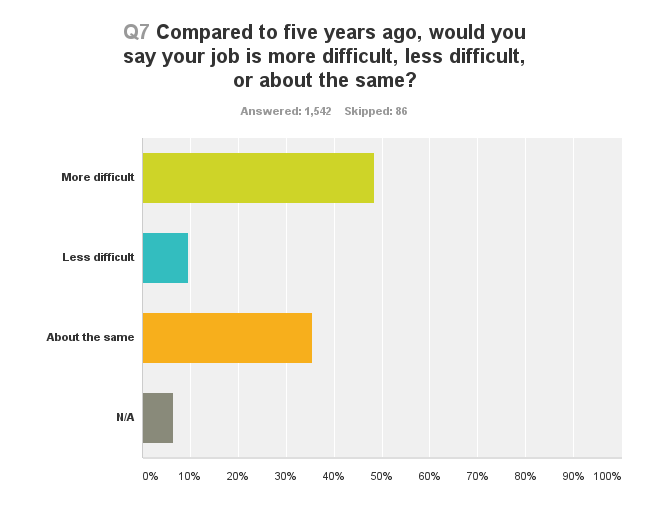Teachers who use group work frequently incorporate some sort of peer assessment activity as a means of encouraging productive interactions within the group. If part of the grade for the group work depends on an assessment by fellow group members, students tend to take their contributions to the group more seriously. Often teachers use some sort of point distribution system where a given number of points must be divided among members, and they cannot be distributed equally. The problem with these systems is that the feedback they provide lacks specificity. Students don’t know what they are doing that accounts for the score they’ve received, and this makes improvement less likely.
Read more ›CURRENT ARTICLE • September 26
OTHER RECENT ARTICLES
Here’s the scenario: Students are taking a chemical thermodynamics course. The instructor solicits clicker responses to a conceptually based multiple-choice question. Students answer individually, write a brief explanation in support of their answer, and indicate how confident they are that their answer is correct. They are then encouraged to discuss their answers with two or three (self-selected) other students. After that discussion, they have the opportunity to change their answer if they wish, write another explanation for the answer, and once again indicate their degree of confidence in their answer. Do you think that discussion would make a difference—particularly, would it make a difference in their understanding of the concept?
Read More ›Creating Connections between Disciplines: What Paintings Can Teach Students about Politics
The liberal arts environment demands that faculty show students connections between disciplines. As a political scientist, I often link course topics with economics, history, and sociology, but last summer I realized that I could make linkages with visual art. Because I was soon traveling to Washington, D.C. and New York City, I could take pictures of paintings at the National Gallery of Art and Metropolitan Museum of Art and then utilize them in my Introduction to World Politics classes.
Read More ›Using "Mulligans" to Enhance Student Participation and Reduce Test Anxiety
When I speak with other professors who work extensively in the classroom, we often find that we share many of the same challenges. Students’ lack of classroom participation in discussion and test anxiety are two of the most common. Many professors try to mitigate these issues through two time-honored pedagogical tactics: a participation grade and extra credit questions on tests. While both tactics can be effective, by applying concepts from gamification research I found a way to both enhance classroom participation and reduce test anxiety with one simple technique.
Read More ›“I just cram for the exam and then forget everything.”
Read More ›Nearly 75 Percent of Faculty Incorporated Technology into their Teaching in the Past Year
When it comes to technology in the classroom, phrases like “faculty resistance” and the importance of getting “faculty buy-in” are tossed around with great frequency. But is that perception still valid? Are all instructors so set in their ways, skeptical of anything new, and fearful of deviating from what they’ve done that it’s nearly impossible to get them to try something new?
Read More ›Editor’s Note: In last week’s Teaching Professor Blog, Maryellen Weimer mentioned an article that originally appeared in the Nov. 2010 issue of The Teaching Professor newsletter. Due to numerous requests from readers, we’re sharing that article here.
Read More ›One of the most enjoyable aspects of running a faculty development program on teaching is seeing first-hand how much our various disciplines intersect when it comes to teaching and learning. Whereas it can be hard, if not impossible, to speak about disciplinary research with colleagues outside our fields, the common teaching problems we face allow for readily understandable dialog, no matter how far apart the discussants’ fields of expertise.
Read More › Self-regulated learning is like your own little secret. It stirs from within you, and is the voice in your head that asks you questions about your learning.
Self-regulated learning is like your own little secret. It stirs from within you, and is the voice in your head that asks you questions about your learning.
We know students do not take it upon themselves to read the syllabus. Yet syllabus indifference still bewilders me after teaching for 25 years, given that my syllabi are conveniently available online and in hard copy, and are replete with information virtually assuring success with my courses.
Read More ›






